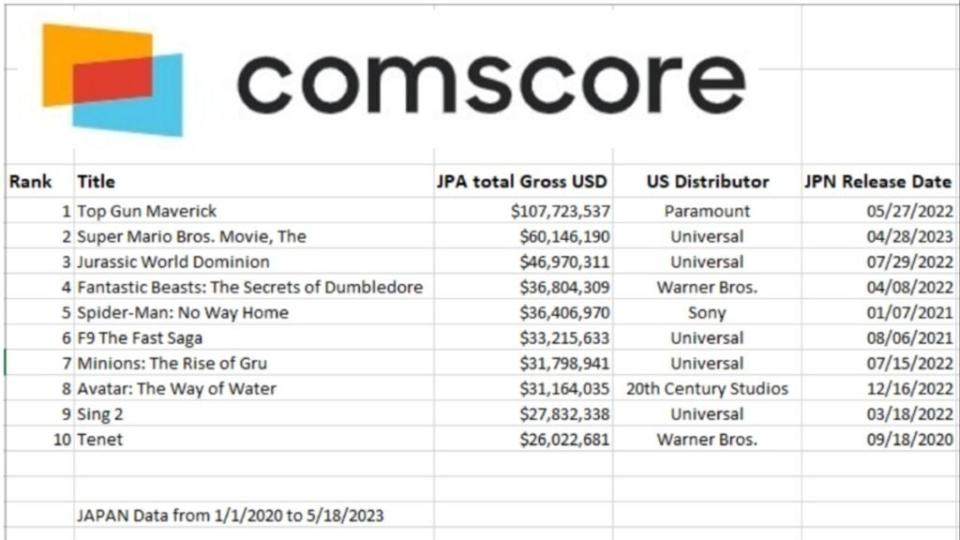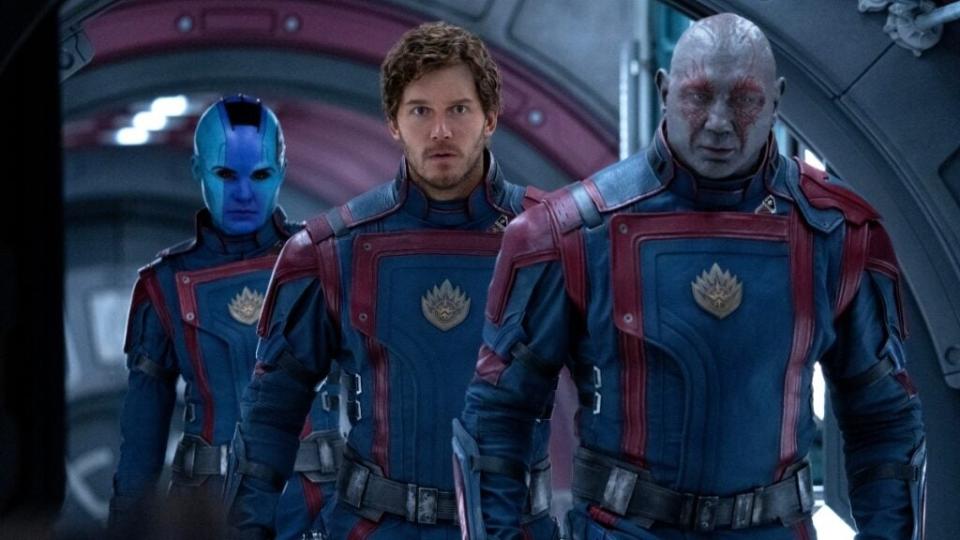‘Super Mario Bros.’ Soars in Japan as ‘Guardians 3’ Holds Firm at China Box Office | Charts
“The Super Mario Bros. Movie” has already topped $1.2 billion worldwide and should end its theatrical run with around $1.3 billion global, the second-biggest animated film ever behind “Frozen II,” which pulled in $1.45 billion in 2019. Alongside its massive $535 million-and-counting domestic total, the next biggest market for “Super Mario” is not China or the U.K. but rather Japan, where it has earned $60 million thus far.
That is one of the biggest cumulative totals in the post-COVID era for a Hollywood film in Japan, between the $46 million earned by “Jurassic World Dominion” and the $101 million earned by “Top Gun: Maverick.” The latter ranks 11th among all-time Hollywood earners in Japan. In terms of video game-based movies, the Chris Pratt/Anya Taylor-Joy/Jack Black fantasy is already over double the $27 million Japanese gross of “Pokémon: Detective Pikachu” in 2019, and just above the $48 million Japanese total of “Resident Evil: Retribution” in 2012 and the $55 million Japanese gross of “Resident Evil: The Final Chapter.”

The Japanese box office has never been terribly predictable. “Frozen” earned $250 million in 2013 while “Frozen II” earned $122 million in 2019. Moreover, their theatrical industry has been dominated of late by local animated tentpoles like “Demon Slayer,” “The First Slam Dunk” and “Suzume.”
Comscore senior media analyst Paul Dergarabedian argued that the success of “The Super Mario Bros. Movie” in Japan is “a testament to the appeal of animated fare” in the country. It also, he added, “reflects the devotion of the family audiences around the world to the movie theater experience when the perfect movie comes along.”
“All of these numbers,” Boxoffice Pro chief analyst Shawn Robbins told TheWrap, “continue to show the volatility of what is effectively ‘the new world’ when it comes to the international box office in a post-pandemic time.”

Marvel’s “Guardians of the Galaxy Vol. 3” held great last weekend for a 12-day total (it began its theatrical play overseas on May 3) of $528 million. That includes a strong $19.5 million second-weekend gross in China, down just 29% from its $28.5 million opening frame. That is a frankly spectacular hold for a Hollywood movie in China, before COVID and now. With $60 million and counting after ten days, the well-reviewed and well-received MCU flick could end up awfully close to the $100 million earned by “Guardians of the Galaxy Vol. 2” in 2017.
Considering the COVID-era absence of MCU movies in China, along with the poor performances of “Black Panther: Wakanda Forever” ($16 million opening three months after its global launch) and “Ant-Man and the Wasp: Quantumania” ($39 million compared to $125 million for “Ant-Man and the Wasp” in 2018), this is very encouraging news for a brand that counted on China to maintain an aura of pop culture domination. It’s worth remembering that, save for the “Avengers” team-up flicks, most Marvel movies earned around $95-$125 million in China even during the 2013-2018 glory days.
Also Read:
‘Fast X’ Review: Jason Momoa Gives the Exhausted Franchise New Drive
That makes sense, and it goes in line with the notion that “Guardians of the Galaxy Vol. 3” is holding well worldwide because audiences are liking what they see and are telling their friends. As for what this means for “The Marvels” and “Captain America: New World Order,” the next batch of MCU movies could be a little more execution-dependent, at least among general audiences. A mere three-star blockbuster won’t be enough to garner four-star box office. That goes for China and the world over.
As one high-ranking distribution executive stated to TheWrap on background back when “Ant-Man and the Wasp” initially underperformed, the soft performance was due to weak reviews and social media buzz. “Coming off ‘Avatar: The Way of Water’ and a strong Chinese New Year slate [like ‘Full River Red’ and ‘Wandering Earth 2’], audiences weren’t going to turn out for a film they perceived to be subpar,” they stated.

Meanwhile, Sony’s “The Pope’s Exorcist” earned $19.5 million in North America, but scored big enough in places like Mexico ($9 million) and Spain ($3.3 million) to cross $70 million worldwide. That’s a sequel-worthy total for an $18 million flick featuring something approximating a marquee character (Russell Crowe is the pope’s exorcist!) which went up against a slew of horror films, including comparatively blockbuster installments in the “Scream” and “Evil Dead” series.
Producer Jeff Katz confirmed that all parties are hopeful that Father Gabriele Amorth’s divine adventures have only just begun. He told TheWrap that the team had turned in a basic sequel treatment just before the strike. There’s no green light, but the hope is that a follow-up for a similar price and the bonus of pre-awareness will allow it to get a boost in North America while maintaining its overseas might.
“If I had to wager, he’ll never be in a straight-up exorcism movie again,” stated Katz, affirming the intent to let the title character bounce around in different horror genres and, where applicable, different faiths. “He’s the Hercule Poirot of horror,” Katz said.
A theoretical “The Pope’s Exorcist’s World Tour” may not be a breakout sequel — think of the follow-ups to “Austin Powers,” “Scream,” “Pitch Perfect” and “John Wick” — in the making. However, if the budget is kept in check it won’t have to be, so no going into space until the fourth or fifth installment!
Speaking of breakout franchises, Lionsgate’s “John Wick: Chapter 4” has now earned $424 million on a $100 million budget, which is over $100 million above the $321 million total of its predecessor.
Most of that upswing came from the overseas box office, which often happens with fourth installments of action franchises as we saw with “Jason Bourne,” “Mission: Impossible – Ghost Protocol,” “Resident Evil: The Final Chapter” and “Fast & Furious.” More importantly, Keanu Reeves’ original, star-driven series has become just the eighth entirely R-rated Hollywood franchise to crack $1 billion worldwide.
Also Read:
Everyone’s a Comedian: Why Hollywood Is Struggling to Bring Comedies Back to Theaters


